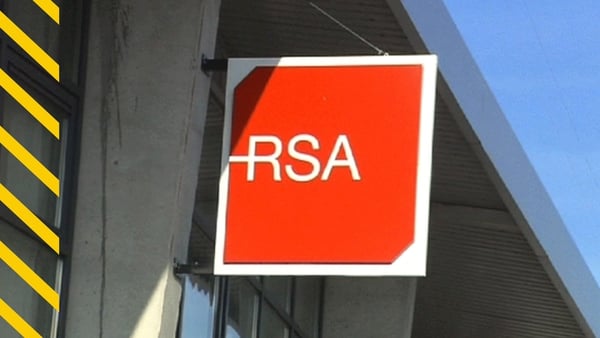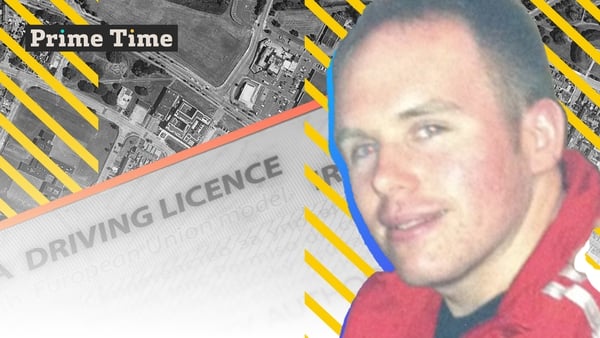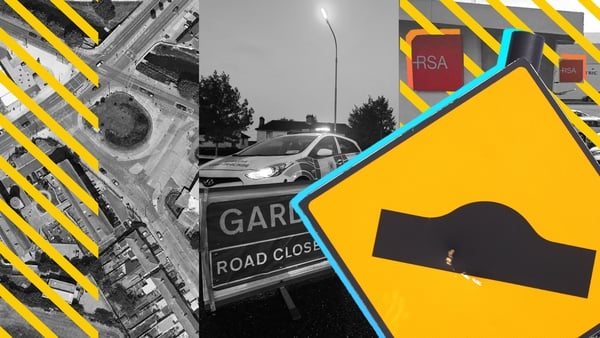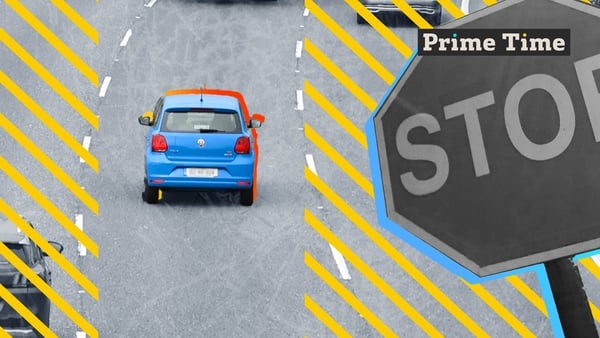More than 60 people have died on Irish roads so far this year.
The bleak start to 2024 continues a worrying recent trend for road fatalities in Ireland. Last year was the worst in nearly a decade, with 188 deaths.
It has prompted Taoiseach Simon Harris to say that road safety will be 'a priority issue' for him in his new role.
Yet as recently as five years ago, Ireland was being celebrated within the EU for road safety, following a reduction in fatalities of over 40%.
So, what, if anything, has changed?
Thirty more people died on the roads in 2023 compared to 2022, and thirty more people aged between 16-25 died on the roads in the same period.
In other words, the increase in that single age category is equal to the overall increase in road deaths which has sparked such significant public and political concern.
That age category has been disproportionately represented in road deaths for years.
Since 2019, people aged between 16 and 25 represent about 20% of all road deaths, despite making up just 12% of the population. Last year, over a quarter of all road fatalities were in that age group.
And it appears to be getting worse. Of the 61 people that have died on our roads in 2024 so far, a third were 25 years old or younger.
The statistics show that young males remain the group most likely to be involved in a fatal collision.
Nearly 80% of the people between the ages of 16 and 25 who died on the roads in 2023 were male.
Dr Michael Gormley says there are multiple reasons why that demographic is more likely to be involved in fatal incidents. He is an Assistant Professor of Psychology at Trinity College Dublin who focuses on driver behaviour, particularly in young males.
"They don't think they're invulnerable. They know about the risks. What they do have is an optimistic bias," he says.
Optimistic bias is the mistaken belief that your chances of experiencing a negative event are lower (or a positive event higher) than your peers. In other words, they understand the risks, but they don’t expect them to impact them.
"They think 'I'm not going to get involved in the collision'. They participate in speeding more. They wear their seat belts less and they drive while intoxicated," Dr Gormley said.
We need your consent to load this Datawrapper contentWe use Datawrapper to manage extra content that can set cookies on your device and collect data about your activity. Please review their details and accept them to load the content.Manage Preferences
Our growing number of road deaths, is bucking the trend in Europe. In early March, the European Commission published a country-by-country analysis comparing road deaths per million inhabitants in 2023 against the average of three pre-pandemic years.
While Ireland's road deaths per million inhabitants is below the EU average, we had by far the worst percentage increase of any country, up 29%. In fact, only Ireland and Norway (14%) saw double-figure percentage increases.
On average, countries saw road deaths fall, not increase, by 12%.
According to the Road Safety Authority's 2021 strategy, we should be adhering closer to that European average, and even exceeding it. In it, the RSA set a target to achieve a 15% fall from the pre-pandemic average by the end of 2024: "to 122 [deaths in 2024] or lower."
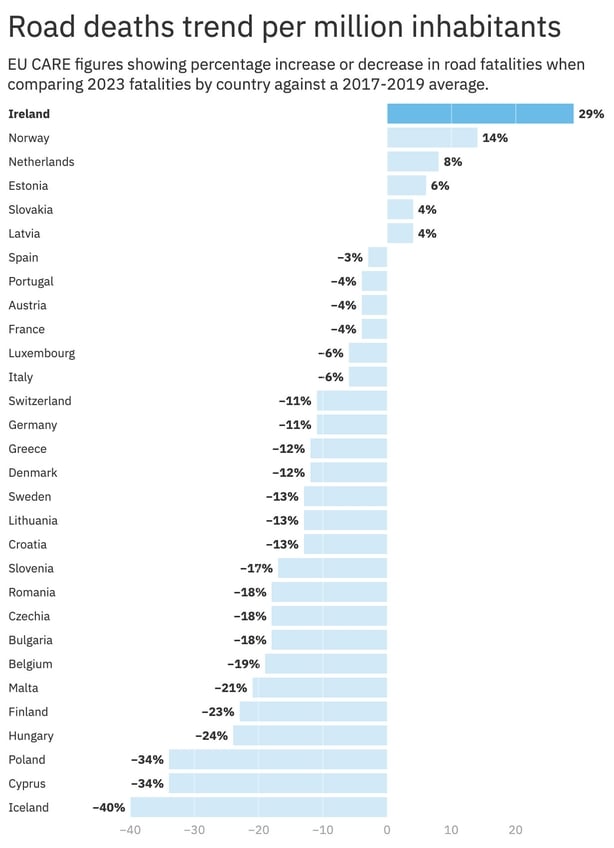
There's no simple explanation for what’s gone wrong, but experts who spoke to Prime Time said intoxicated driving, speeding, legal enforcement and policing, driver distraction, and road layout, are all contributing factors.
Intoxicated driving
"We had thought that we were getting on top of the drink driving problem and that it was going to decrease. But evidence has shown that is not the case," Professor Denis Cusack told Prime Time.
He is the director of the Medical Bureau of Road Safety (MBRS) at University College Dublin (UCD).
"Sadly drink-driving remains a very serious concern as a contributory factor to road traffic crashes," Prof Cusack said.
One in ten people say they drove having consumed alcohol in the last year, according to a research survey from the Road Safety Authority (RSA) published in January.
The survey, which measures social attitudes among drivers, also found that a quarter of drivers feel making local journeys after one drink is acceptable.
73% said driving under the influence was unacceptable among friends and peers. That's down 12% compared to answers provided in a comparable survey published in 2019.
In other words, the survey indicates, it is becoming more socially acceptable to drink and drive.
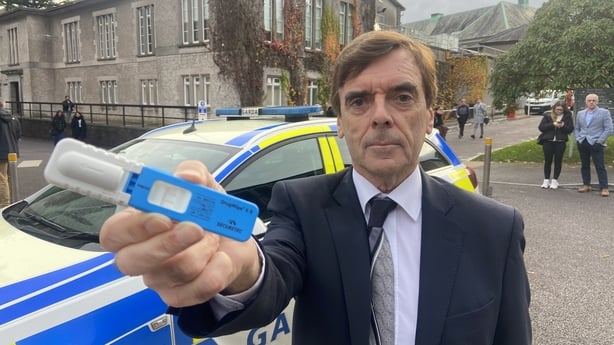
The latest available data on the impact on drink-driving on road fatalities covers 2015 to 2019. It indicates 37% of all driver fatalities in those years included a positive toxicology result for alcohol.
Of the fatalities where alcohol was detected, the dead were typically male, and under the age of 45. These deaths generally occurred in the late evening or early hours of the morning, and at the weekend.
The MBRS, where Prof Cusack has worked since 1997, is the national body responsible for testing samples taken by gardaí for the presence of drugs or alcohol.
He believes the prevalence of drink driving has "at best, stayed the same" in the decades he has been working there.
"Out of the 188 road deaths last year, statistically, about 56 of them had alcohol as a contributory factor and probably about half that number may have had drugs as a contributory factor," he told Prime Time.
The MBRS analysed 3,669 positive tests for driving while under the influence of drugs last year.
Two drugs, cannabis and cocaine, appeared most often. Cannabis was present in half of all positive tests while cocaine appeared 27% of the time.
While the total number of arrests for driving while intoxicated was similar in 2023 to 2022, the proportion involving drugs increased significantly.
Some 36% of the approximately 7,400 people arrested were detained based on the suspicion they had drugs in their system.
Speaking to reporters at the launch of a road safety appeal in December, senior gardaí said it was not known whether that increase is down to more drug driving or better detection, which has become more effective with improving technology.
"Regardless of whether it's alcohol or one of the other types of drugs, it [driving while intoxicated] has a very serious and dangerous effect on contributing to crashes," Prof Cusack said.
Speeding
Speeding is the other major factor in road fatalities. The statistics show it is also disproportionately prevalent in the deaths of male drivers.
87% of the drivers killed on the roads while driving above an appropriate speed were male, according to the latest available RSA data.
With speeding and intoxicated driving contributing to dozens of fatalities each year, the Government is hoping the forthcoming Road Traffic Bill can do something to address both.
It will introduce mandatory checks for drugs at the scene of collisions and is expected to pass through the final stage of the Oireachtas legislative process this week, before being sent to the president to be signed into law.
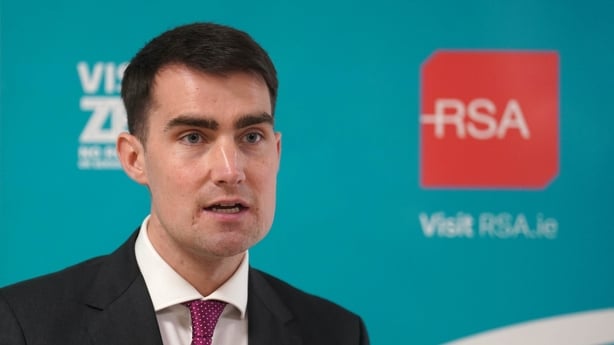
It will also allow for lower speed limits in rural and urban areas.
The default speed limit on national secondary roads will be put at 80km/h, down from 100km/h. It will be reduced from 80km/h to 60km/h on rural or local roads, and from 50km/h to 30km/h on roads in urban areas.
However, local authorities will have flexibility to maintain higher speed limits on roads where they consider it safe to do so.
Some road safety campaigners are critical of the leeway being provided.
"Even when this law does come up at the end of the day, it's down to each individual county council, whether to apply the lower limits or not. They're only guidelines that the Government is going to be proposing," Susan Gray of the PARC (Promoting Awareness, Responsibility and Care) Road Safety Group said.
"We fear that when the guidelines are brought out, local county councils will not adjust the speed limits. And, even if it did work, we're back to enforcement," Ms Gray added.
The government minister with responsibility for road safety, Jack Chambers, said in January that local authorities will be expected to carry out speed limit reviews this summer, with revised limits to be rolled out by the end of the year.
Read: 'Culture of recklessness' on roads, says minister
The reduction from 80km/h to 60km/h in the default limit of on rural roads could be important.
In 2023, almost three-quarters of all road deaths occurred on rural roads where the speed limit was 80km/h or higher.
And it appears this trend has continued in 2024.
We need your consent to load this Datawrapper contentWe use Datawrapper to manage extra content that can set cookies on your device and collect data about your activity. Please review their details and accept them to load the content.Manage Preferences
Campaigners point out that reduced speed limits will only have a positive impact if they are adhered to and enforced. They say ensuring fewer people drive dangerously requires an increased policing presence on the roads.
"Gardaí keep saying the numbers of gardaí in roads policing fluctuates. They welcome the use of speed cameras as an alternative. But speed cameras will never catch someone drink-driving or on their phone," Ms Gray added.
Board minutes from meetings of the RSA in late last year appear to indicate a level of agreement. At the time, a major uptick in road deaths was attracting significant public attention.
"2023 has seen the highest fatalities in a decade..." the minutes from the December RSA board meeting note. "More focus is needed on enforcement, which was discussed at the Ministerial Committee Meeting."
The October minutes say "all enforcement interventions are down. Need increased enforcement to change the current culture of driving."
Susan Gray of PARC is calling for an increase in roadside testing by Gardaí.
"When the random breath checks were brought in in 2006, they put the fear of God into people. Numbers came down dramatically and there was a mass change in driver behaviour," she told Prime Time.
"It was advertised everywhere by the Gardaí. 'We will be out there. We can test you any time.' And they were out there. It wasn't a bluff."

In 2023, gardaí carried out 166,500 breath tests on the roads, approximately half the number carried out (316,000) in 2019.
Asked about the fall-off in testing, in a statement to Prime Time, Garda management noted there was an increase in the number of people arrested for intoxicated driving during that same period.
It attributes the increase in arrests to a better detection strategy.
"While there was a reduction in the number of breath tests recorded at Mandatory Intoxication Testing checkpoints, there is a 5% increase in the number of drivers detected and arrested for driving under the influence in 2023 (8,200 approx.) compared to 2018 (7,750) and a marginal 1% increase compared to 2019," the statement said.
Regardless of the merits of the policing strategy, it is questionable whether there is any capacity within An Garda Síochána to significantly increase the number of checkpoints and breath tests.
Figures from the Department of Justice show that personnel attached to the Roads Policing Unit (RPU) have fallen by more than 100 in less than two years.
The shortage of personnel in the RPU has been acknowledged by Minister Jack Chambers who told RTÉ in recent weeks that the number of gardaí policing the roads is "not sufficient and isn't acceptable" adding that he had expressed concern over the lower number to Garda Commissioner Drew Harris.
In a statement to Prime Time, An Garda Síochána said: "As recruitment continues and accelerates, additional Garda members will become available to be deployed to priority areas, including Roads Policing."
A Department of Justice statement to Prime Time noted that "funding provided by the Government under Budget 2024 will allow for the recruitment of 800-1000 new Gardaí, which will increase the number of frontline Gardaí and also allow for the expansion of specialist units such as Roads Policing."
For campaigners like Susan Gray of PARC, while commitments to increase numbers in Roads Policing are welcome, action is needed sooner rather than later.
"We believe the increase in road deaths is mainly to do with the lack of visible enforcement," Ms Gray said.
"We can bring in as many acts and speed vans as we like, but without the Roads Policing Unit being properly resourced, people will continue to die and get injured in collisions."
In-depth coverage of road safety issues from the RTÉ Current Affairs Digital Unit and Prime Time continues across the week online and on television, with a special programme on the 11 April edition of Prime Time.


